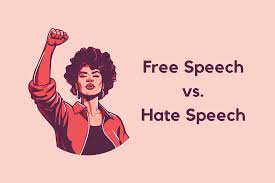Freedom of expression is universally acknowledged as a fundamental human right, enshrined in various international conventions and constitutional frameworks around the world. It is a pillar of democracy, allowing individuals to voice opinions, share ideas, criticize authorities, and participate meaningfully in public discourse. However, this right is not absolute. As societies have evolved, a growing debate has emerged around the limits of free speech, particularly where it intersects with hate speech—expression that disparages, discriminates against, or incites violence towards individuals or groups based on characteristics such as race, religion, ethnicity, gender, or sexual orientation. This article explores the complex relationship between free speech and hate speech, the legal and ethical challenges involved, and the way forward in balancing these conflicting interests.
Understanding Free Speech: At its core, free speech embodies the right of individuals to express their thoughts, opinions, and ideas without fear of censorship or governmental restraint. Article 19 of the Universal Declaration of Human Rights (UDHR) states:
“Everyone has the right to freedom of opinion and expression; this right includes freedom to hold opinions without interference and to seek, receive, and impart information and ideas through any media and regardless of frontiers.”
Free speech is fundamental to personal autonomy, the search for truth, democratic governance, and social progress. It enables public participation in decision-making, holds power accountable, and fosters open debate. Jurisdictions such as the United States strongly protect free speech under constitutional provisions, such as the First Amendment.
However, even the strongest free speech proponents recognize that no right is without limits. Absolute freedom can lead to harm, disruption, and violation of the rights of others. This is where the concept of hate speech becomes crucial.
Define hate speech: Hate speech refers to any form of expression, whether verbal, written, or symbolic, that attacks, discriminates against, or incites hatred or violence against individuals or groups based on protected characteristics. Examples include derogatory comments about a religious minority, racial slurs, or calls for violent action against marginalized communities.
International human rights frameworks, such as the International Covenant on Civil and Political Rights (ICCPR), recognize the importance of balancing freedom of expression with the prohibition of hate speech. Article 20 of the ICCPR explicitly requires:
“Any advocacy of national, racial or religious hatred that constitutes incitement to discrimination, hostility, or violence shall be prohibited by law.”
Unlike free speech, hate speech is not viewed as a right but rather as a harmful conduct that undermines the dignity, safety, and equality of individuals and communities.
The Conflict: Free Speech vs. Hate Speech: The key challenge lies in determining where to draw the line between legitimate expression and unlawful hate speech. Several important questions arise in this context:
- who decided what constitute hate speech?
- is offensive speech the same as hate speech ?
- should all forms of offensive speech be prohibited ?
- how do we protect vulnerable groups without stifling freedom of expression?
Arguments for Hate Speech Regulation: On the other hand, advocates for regulating hate speech argue that such expressions go beyond mere opinions and actively endanger public order, social cohesion, and the physical and psychological well-being of targeted groups. Hate speech fosters discrimination, social division, and even violence. Therefore, they claim, democratic societies must restrict hate speech to protect fundamental rights of dignity, equality, and non-discrimination.
Courts in Europe, for instance, follow a more balanced approach, where freedom of expression is not absolute and is subject to restrictions to protect public order, national security, and individual rights.
India provides for freedom of speech under Article 19(1)(a) of the Constitution, but it also imposes reasonable restrictions under Article 19(2) for public order, morality, decency, and sovereignty of the state. The Indian Penal Code contains provisions to punish hate speech, such as Sections 153A (promoting enmity between groups) and 295A (deliberate acts intended to outrage religious feelings).
- Clear Definitions:
Legislators must clearly define hate speech in a manner that targets incitement to discrimination, hostility, or violence without being overbroad. - Judicial Oversight:
Courts must play a key role in applying strict standards to ensure restrictions on speech are justified, proportionate, and necessary in a democratic society. - Promoting Counter-Speech:
Rather than suppressing hateful views alone, society should encourage counter-speech, education, and open debate to challenge harmful ideologies. - International Cooperation:
Global challenges posed by hate speech, especially online, require coordinated international strategies, harmonizing legal standards and promoting transparency from social media companies.
conclusion: Free speech is a cornerstone of democracy, while hate speech poses a significant threat to social harmony, dignity, and individual rights. Striking the right balance is a delicate and ongoing challenge for legislators, courts, and civil society. Absolute freedom risks harm, while over-regulation risks authoritarianism. A well-calibrated, principled approach that combines clear legal standards, judicial prudence, technological accountability, and societal responsibility offers the best way to uphold freedom of expression while combating hate speech.
Contributed By – Kavi Nandan Biswas

